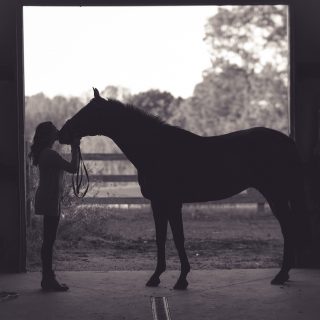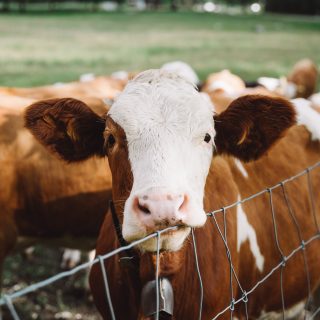In the first part of our interview, we introduced Dr Anna Schwahofer who makes decisions on thousands of animals’ lives day by day. In the second part, she talks about the daily routine of a vet working in livestock care; why she decided to find a job here instead of equine care and if there’s a pay gap between small and large animal practices. She also gives us an insight into some of her memorable cases.
When and why did you decide to pursue livestock care as a career?
When I obtained my degree, I was 100% sure I wanted to work with horses. Later on I realized that equine care involves driving around 400-600 miles a day, in Hungary and abroad alike. If you want to attend to 5 animals a day but they are 30 miles from each other, you will actually work only 2.5-3 hours while you’re driving all day. You need a lot of time and energy, which has affected the private lives of many colleagues.
So I decided that I don’t want to work in equine care only. I was not attracted to small animal care. I occasionally substitute in a small animal clinic, which is quite enough for me to maintain my skills but I prefer livestock care where you can heal them in large numbers. Also, if you have a small animal practice, you need to “manage” 20-30 different owners each day while you meet the same ten people at the farms every day. That was another positive factor for me.
What do you love the most about your job?
I love the reproductive biology cases the most, including the related statistics and ultrasound examinations. It’s very important to constantly monitor the yield of pigs and cattle because they are both sensitive to any changes. These statistics can help us to quickly collect a lot of information on the health status of the entire population. If you conduct these examinations week by week, you can clearly see the trends demonstrated by the animals’ reproductive biological and health indicators.
What is the personal side of this profession like? What advice would you give to those who choose livestock care?
If you work in this area, it’s terribly difficult to plan ahead and hard to maintain personal relationships because you are often called at night, at the weekends and on national holidays. You must be prepared for that, it’s a real challenge.
My advice is: unless you really love it, don’t choose this area. It’s not easy, this is not a Monday to Friday, 9 to 5 job because of the many night and weekend calls. You must love what you do, otherwise you won’t be able to carry on. Of course, I’m not saying I always get up with a broad smile on my face in the middle of a Saturday night when I’m called to a problem case, but loving what you do can help a lot. You have to be persistent but you need to set the boundaries in time, too.
Experience shows that livestock vets tend to work until the age of 50-60, particularly because of the unpredictability. You have to learn to draw the line and say no. Otherwise you may burn out very soon. In my experience, the best way to wind down is to travel. In other words: make a lot of money and then travel. That’s the best balance.
Now that you mentioned money; you said you work in a small animal clinic, too. In your experience, is there a pay gap between small and large animal practices?
I think it doesn’t depend on the sector. Your income rather depends on if you’re an employed vet or you run your own practice. Before the 1990s, small and large animal practices were not so sharply separated in Hungary. All vets were “bag-carriers”: they had about 5 towns or villages in their district where they performed all kinds of tasks. The small animal practice as a separate field began to emerge after the 1990s and many people switched for this area. Today Hungary has a lot of small animal clinics functioning at a Western European level. If you’re the owner of such a clinic, you do very well. If you’re an employee there, not so much. Basically, the problem is that even though many clinics employ vets, the management doesn’t pay enough attention to constant training and proper remuneration so they can’t keep vets for the long run.
The same applies to the livestock area; being an employee is not as good as having your own practice. I think your income primarily depends on your luck, skills and persistence. I basically want to stay in the livestock area and bring the best out of myself here. I can learn something everyday here.
 Did you have any memorable cases you remember to this day?
Did you have any memorable cases you remember to this day?
Many. There’s a quote from James Herriot[1] that very much applies to the veterinary profession. It goes something like this: this profession gives you a unique opportunity to make an utter fool or a celebrated hero of yourself within a matter of seconds, and you won’t really understand why. Biology is a funny thing, after all. The greatest successes usually take place in the dark and in the presence of very few people. They never happen when a lot of people are looking.
Let me give you a positive example, you’re always happy to remember those. There was an equine case when the animal practically impaled himself on a plank which pierced 15 inches deep into the muscle between the breast and the shoulder, with a huge gaping hole there. It was in the winter, too and a Friday night. I had to go to the middle of nowhere and attend to the horse under the light of a contraption made on site. I managed and the horse fully recovered.
There was another case when I was called to a difficult birth at a cattle farm. By the time I got there, they had already been trying for hours to get the calf out because it was in an abnormal position. It was my first case like this at that farm; I was still a newbie. When I started it, I heard the remarks from the local men who had already tried to do it by force. They said it was impossible and the doc, being a woman, can’t do it, either. After about fifteen minutes of poking and searching, I managed to turn the calf in the right direction so she could be born healthy. It’s always a good feeling if you can help with these difficult births and both the mother and the calf survive. For example, if the cow has a vaginal prolapse and the farm lets me know in time, I can put it back and the animal can still give birth. It’s always a big struggle because the risk of infection is very high. But I like these cases and I always feel good if I could help.
These are the cases that make you love your profession, otherwise you wouldn’t be able to do it.
[1] James Herriot, born James Alfred Wight (3 October 1916 – 23 February 1995) was a British veterinary surgeon and writer. He is best known for his semi-autobiographical books and stories.
